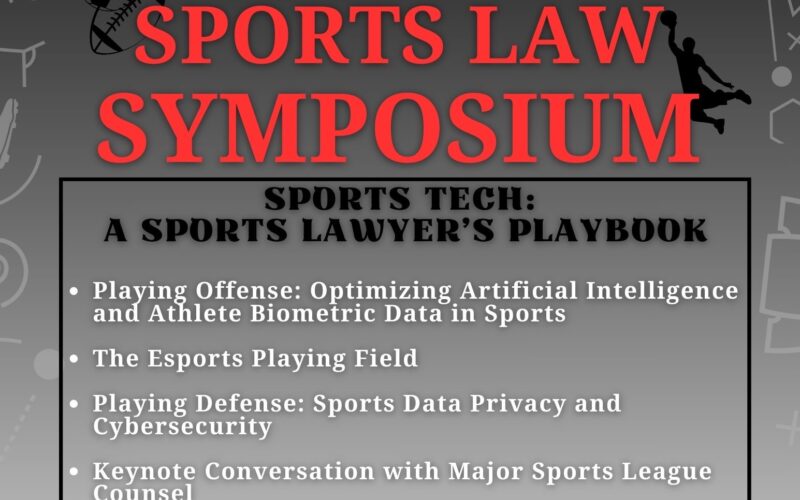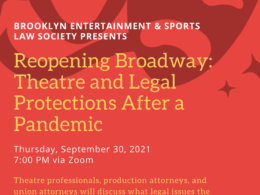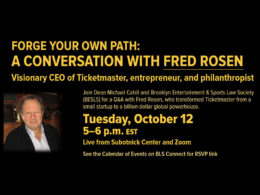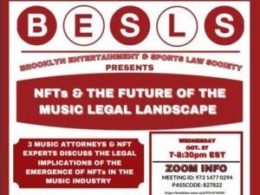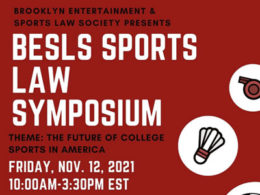On Friday, October 27th, the Brooklyn Entertainment and Sports Law Society (BESLS) and the Intellectual Property Law Association (IPLA) hosted the third annual Brooklyn Law School Sports Law Symposium. The symposium theme was “Sports Tech: A Sports Lawyer’s Playbook.”
The second panel of the day, “The Esports Playing Field,” provided insightful conversation on the growth of Esports and allowed practitioners to describe their work in the unique and upcoming field of practice. David Fish (Senior Litigation Counsel at Romano Law) moderated the panel and was joined by Peter Tringali (Senior Legal Counsel at New York Red Bulls), Harris Peskin (Partner at ESG Law), and Roger Quiles (Founding Partner at Quiles Law).
The panelists began with an overview of Esports as the fastest-growing sport in the world, along with a discussion on the growing practice area tied to it. All three panelists summarized how they got involved in this now flourishing field. Mr. Tringali, who works primarily with the Red Bulls physical teams, discussed endorsement deals with gamers and the rise of the MLS Esports FIFA league. Mr. Peskin, who currently represents many major Esports teams, left his corporate firm to run a team in Germany. Meanwhile, Mr. Quiles founded an Esports Law Firm (one of the first of its kind), hoping to gain a 360-degree view of the industry. He currently deals with mostly business or talent-sided work rather than representing teams directly.
A key topic that influenced the discussion was the role of the game developer versus the representation of teams. Mr. Peskin conferred the difficulty of this issue by reminding the audience of the exclusivity of copyrights owned by game developers and the uniqueness of the sport where developers run the league. He explained the main issue with revenue distribution for teams is that the company owns the league, and the league then owns the teams, which in turn contracts the players. Mr. Tringali disagreed, explaining that even with this distinction, Esports still mirrors sports in general: Area, licensing, and spectators exist in both physical and digital sports and the lawyer’s role in the Esports sphere is almost identical to those working on physical teams. Even if the developer is involved in tasks such as player contract negotiation, the involvement is often pushed to the background, and the lawyer is still dealing with a two-party system.
Mr. Quiles tackled the topic from a different angle. Drawing on work experience, he described the rights ownership issues in Esports. Namely, game developers often determine monetization of content. All of the panelists echoed Mr. Quiles’s sentiments recounting how developers can (and have) prevented tournaments from happening and can ban players from playing worldwide forever, with limited justification.
In order to fix this issue, all three panelists turned to the topic of unionization in esports. Currently, the players’ association is not a union, and even with successful strikes, many of the players do not wish to form a union. From the lawyer’s perspective, Mr. Peskin explains this makes it difficult to represent them when the it is difficult to discern whether players’ employer is the team, developers, league, or other entity.
Much of the conversation that followed centered around the wages of players themselves. Mr. Peskin noted that if players unionize, they risk the placement of a salary cap on their union and overall, can lose money if unionized. All three panelists turned to the example of the failed overwatch league. Mr. Quiles explained how the game was a new piece of intellectual property, and most players migrated to the league after playing other games professionally. The league attempted to place a salary cap on the players who had not yet even tried to form a union and in return, the league was sued by the Department of Justice under the Sherman Anti-Trust Act.
Mr. Tringali offered closing remarks on the future of Esports. He mentioned the fact that Red Bull (and the other MLS organizations) see Esports as a way to draw in new spectators who may not watch soccer but who play it as a game. Sponsorship in Esports is more fluid, Mr. Tringali described, and traditional teams borrow pieces of the playbook from Esports organizations. Overall, with the inevitable growth of the industry as a whole, it seems as if the Esports landscape will only get more complicated.
BESLS, IPLA, and everyone in attendance would like to thank the panelists and moderator for an insightful conversation on the world of Esports.
